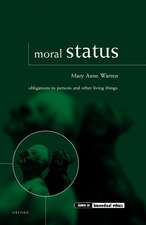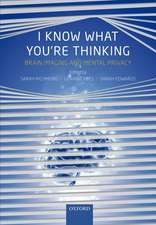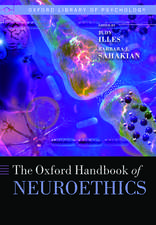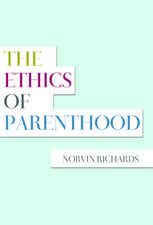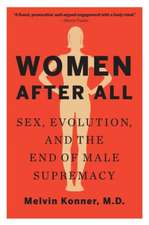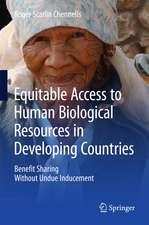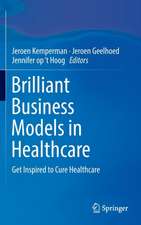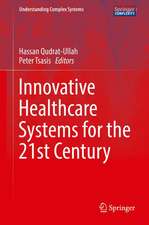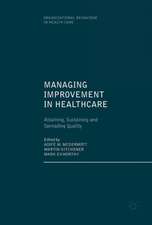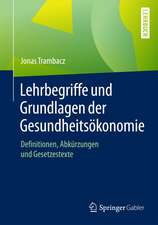Exchanging Human Bodily Material: Rethinking Bodies and Markets
Autor Klaus Hoeyeren Limba Engleză Hardback – 4 ian 2013
| Toate formatele și edițiile | Preț | Express |
|---|---|---|
| Paperback (1) | 935.80 lei 6-8 săpt. | |
| SPRINGER NETHERLANDS – 18 iun 2015 | 935.80 lei 6-8 săpt. | |
| Hardback (1) | 947.18 lei 6-8 săpt. | |
| SPRINGER NETHERLANDS – 4 ian 2013 | 947.18 lei 6-8 săpt. |
Preț: 947.18 lei
Preț vechi: 1155.11 lei
-18% Nou
Puncte Express: 1421
Preț estimativ în valută:
181.25€ • 187.27$ • 150.78£
181.25€ • 187.27$ • 150.78£
Carte tipărită la comandă
Livrare economică 19 martie-02 aprilie
Preluare comenzi: 021 569.72.76
Specificații
ISBN-13: 9789400752634
ISBN-10: 9400752636
Pagini: 204
Ilustrații: XI, 191 p.
Dimensiuni: 155 x 235 x 20 mm
Greutate: 0.49 kg
Ediția:2013
Editura: SPRINGER NETHERLANDS
Colecția Springer
Locul publicării:Dordrecht, Netherlands
ISBN-10: 9400752636
Pagini: 204
Ilustrații: XI, 191 p.
Dimensiuni: 155 x 235 x 20 mm
Greutate: 0.49 kg
Ediția:2013
Editura: SPRINGER NETHERLANDS
Colecția Springer
Locul publicării:Dordrecht, Netherlands
Public țintă
ResearchCuprins
1. Introduction.- 2. What is a market?.- 3. What is a human body?.-4. Ubject exchange as everyday practice.- 5. Ubjectology.- 6. Conclusion.
Recenzii
“A central aim of the book is to inspect the categories deployed in polarized debates about ‘markets in body parts’. … Although Hoeyer’s work is perhaps most likely to be referenced in fields such as medical anthropology or bioethics, his study presents fresh analytic approaches backed by empirical detail that may be of interest to those working across the various trajectories of science and technology studies.” (Tyler Hnatuk, Metascience, Vol. 24, 2015)
“The author aims the book primarily at the community of anthropological, sociological, and science, technology, and society (STS) scholars. The author hopes that philosophical ethicists, economists, and legal scholars also will find it useful for engaging in the discussion of the exchange of human bodily materials from new angles. … The author’s careful deconstructive work is insightful and well researched. The book is likely to have broad interdisciplinary appeal, especially considering the rising appeal of biopolitics in a number of fields.” (Devan Stahl, Doody’s Book Reviews, July, 2013)
“The author aims the book primarily at the community of anthropological, sociological, and science, technology, and society (STS) scholars. The author hopes that philosophical ethicists, economists, and legal scholars also will find it useful for engaging in the discussion of the exchange of human bodily materials from new angles. … The author’s careful deconstructive work is insightful and well researched. The book is likely to have broad interdisciplinary appeal, especially considering the rising appeal of biopolitics in a number of fields.” (Devan Stahl, Doody’s Book Reviews, July, 2013)
Textul de pe ultima copertă
This book addresses the debate usually tagged as being about ’markets in human body parts’ which is antagonistically divided into pro-market and anti-market positions. The author provides a set of propositions about how to approach this and shows a way out of the concrete impasse of it.
Assumptions about markets and bodies that characterize this debate are analyzed and described while the author argues that these assumptions are in fact constitutive for exchanges of human bodily material – but in unacknowledged ways. It is concluded that what we need is a different analytical approach to better understand the mechanisms at play when organizations exchange organs, tissues and cells for use in transplantation and fertility medicine.
Assumptions about markets and bodies that characterize this debate are analyzed and described while the author argues that these assumptions are in fact constitutive for exchanges of human bodily material – but in unacknowledged ways. It is concluded that what we need is a different analytical approach to better understand the mechanisms at play when organizations exchange organs, tissues and cells for use in transplantation and fertility medicine.
Assumptions about markets and bodies that characterize this debate are analyzed and described while the author argues that these assumptions are in fact constitutive for exchanges of human bodily material – but in unacknowledged ways. It is concluded that what we need is a different analytical approach to better understand the mechanisms at play when organizations exchange organs, tissues and cells for use in transplantation and fertility medicine.
Assumptions about markets and bodies that characterize this debate are analyzed and described while the author argues that these assumptions are in fact constitutive for exchanges of human bodily material – but in unacknowledged ways. It is concluded that what we need is a different analytical approach to better understand the mechanisms at play when organizations exchange organs, tissues and cells for use in transplantation and fertility medicine.
Caracteristici
First book to give a comprehensive introduction to pro-and anti-market positions in the debate about exchange of human body parts Serves as entry point to the literature on human body part exchange across disciplinary fields Serves as an inspiration for empirical ethicists and other ethnographers working on other topics characterized by similar antagonism?

